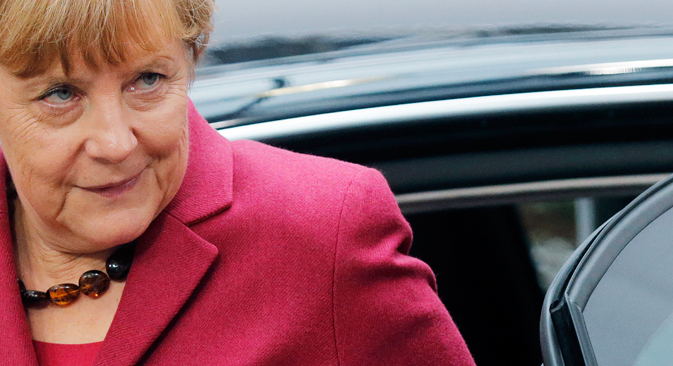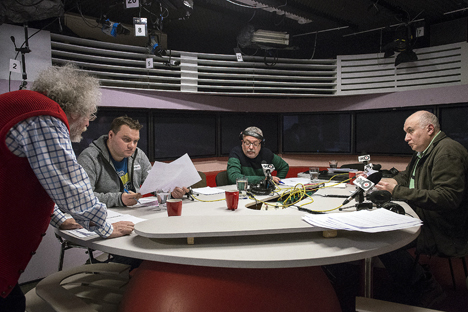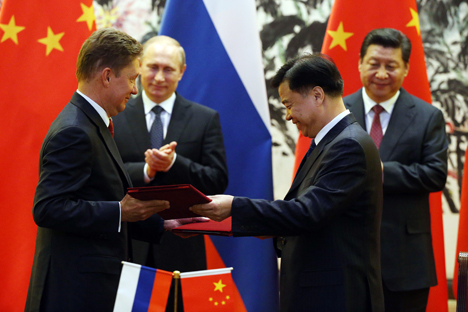Press Digest: No new sectorial sanctions on Russia from EU, says Merkel

German Chancellor Angela Merkel has announced that the EU will not impose new sectorial sanctions on Russia this time. Source: Reuters
The Kommersant newspaper writes that the European Union is preparing to increase its sanctions against Russia as a result of the Nov. 2 elections in the self-proclaimed Donetsk People’s Republic (DPR) and Lugansk People’s Republic (LPR) in the Donbass region of eastern Ukraine. Brussels believes that the elections took place contrary to the Minsk peace agreements and have led not to a de-escalation of the crisis, but to its transformation into a frozen conflict with the possibility of intensification. Washington, adds the newspaper, is of the same opinion. However, the U.S. has still not announced when a decision on whether to introduce new restrictive measures on Russia and the Donbass republics will be taken.
Kommersant also tells its readers that German Chancellor Angela Merkel, on the other hand, has announced that the EU will not impose new sectorial sanctions on Russia this time. According to Merkel, the EU may only expand the list of individuals who are forbidden from entering the EU and whose accounts have been frozen. A Kommersant source in the EU has clarified that the new personalized sanctions, "if they are introduced," will mainly affect the representatives of the DPR and LPR.
The newspaper's source explained that new sanctions will not be imposed on Moscow for two reasons: firstly, because the sanctions need to be approved by all 28 EU countries, which currently, in his opinion, is unrealistic; secondly, because the Russian government has not officially recognized the results of the elections in the self-proclaimed republics.
The Moskovsky Komsomolets newspaper cites Speaker of the Russian Federation Council Valentina Matviyenko as saying that Angela Merkel's words are a "positive sign." "It is time to stop trying to isolate Russia," said Matvienko. "This kind of activity does not produce any results, but only creates more tension." In her opinion, writes the newspaper, Russia, the EU and the U.S. must concentrate their attention on fighting the challenges and threats that are increasing in the world.
According to the Speaker of the Federation Council, the West is beginning to understand that the sanctions are counterproductive and cannot change Russia's principles and foreign policy, concludes the newspaper.
The Nezavisimaya Gazeta newspaper writes that, as the difficult negotiations on the candidature of Ukraine's prime minister are taking place, a scandal has broken out concerning the main contender, Prime Minister Arseniy Yatsenyuk. The newspaper says that Yuri Sirotyuk, member of the parliamentary committee on national security and defense and deputy from the Svoboda Party, has appealed to the Prosecutor General's Office with a request to investigate the reason for Ukraine's loss of part of its military-industrial complex in the Donbass.
The deputy himself believes that the reason lies in Yatsenyuk and former Minister of Economic Development Pavel Sheremet's “criminal inactivity,” explains the newspaper. Sirotyuk told Nezavisimaya Gazeta that Ukraine's key problem is officials' chronic non-fulfillment of laws and direct duties. He said that due to the executive government's negligence, valuable equipment and technical documentation belonging to many enterprises from the military-industrial complex was taken out of the country.
Valentin Badrak, director of Ukraine’s Center of Army, Conversion and Disarmament Research confirmed that defensive equipment and documentation in the Donbass had indeed been seized.
All rights reserved by Rossiyskaya Gazeta.
Subscribe
to our newsletter!
Get the week's best stories straight to your inbox

